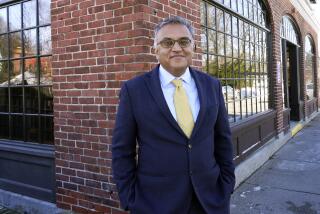Format of Special Includes Panel to ‘Grapple With Issues’
- Share via
NEW YORK — “A working strategy session on AIDS,” is what the producers of Tuesday’s two-hour special are aiming for. The special, “AIDS--A National Inquiry,” is part of “Frontline,” the documentary series produced by Boston’s WGBH.
What makes this program a departure from the usual “Frontline” presentation is that it includes a discussion among more than 20 panelists in four cities, linked by satellite. Panel topics will cover the medical, public safety and civil liberties issues surrounding the dreaded disease.
(In Los Angeles, KCET Channel 28 is one of many stations that will follow the national program with its own hour discussion at 10 p.m.)
Local panelists include Paula Van Ness, director of AIDS Project Los Angeles and chairperson of the National AIDS Network; Dr. Shirley Fanin, associate deputy director of the communicable diseases control program of the Los Angeles County Department of Public Health; Los Angeles City Councilman Joel Wachs; David Schulman of the Los Angeles city attorney’s office; Rev. Carl Bean, executive director of the Minority AIDS Project of Los Angeles; and AIDS victim Christopher Shibar.
Mike Kirk, the producer of the national program, discussed it in a telephone interview from Boston: “We’re going to grapple with the problems, and try to come away with some sense of reality and of what we can do, as well as with the sense of what we really should be afraid of. We hope we’ll demythologize some of the issues.”
Referring to AIDS as “the epidemic of our time,” Kirk said the “Frontline” staff initially planned an hourlong taped documentary along the lines of the series’ usual format. “But the story, as well as the policy options, changes fast,” he said. “We want it to be on the story, but we realized we had to be there live .”
According to Kirk, “Frontline’s” camera crews will be “in the field” with representatives from the medical and scientific communities, the gay community and government agencies on locations at a San Francisco hospital, a Denver shopping mall and a Houston design center. “We wanted to be out in the communities that are being affected,” said Kirk.
However, most of the experts are scheduled to be based at the National Institutes of Health in Bethesda, Md.
Kirk also said that viewers will be provided access to information through local and national “hot lines,” and after the program will be directed to sources of information through a network of organizations including the American Red Cross, the National Public Health Service and the National Gay Task Force.
“There will be a lot of questions on the part of viewers,” said Kirk, adding, “in the end, this is a human problem, and it’s a problem that is breaking a lot of people’s hearts.”
More to Read
The complete guide to home viewing
Get Screen Gab for everything about the TV shows and streaming movies everyone’s talking about.
You may occasionally receive promotional content from the Los Angeles Times.






